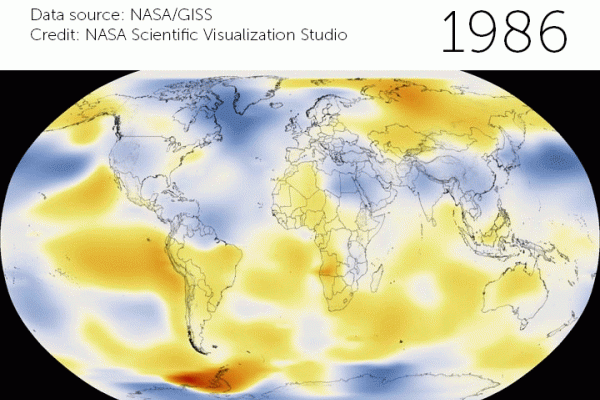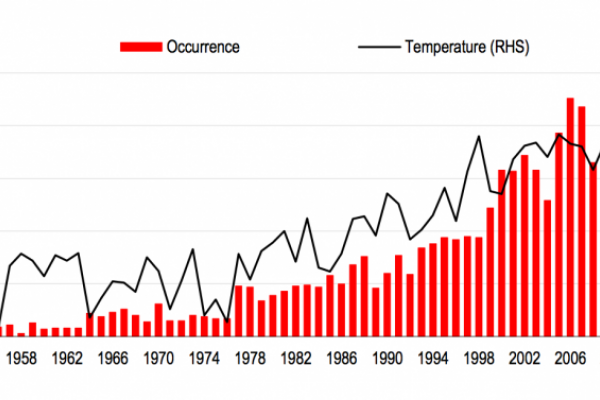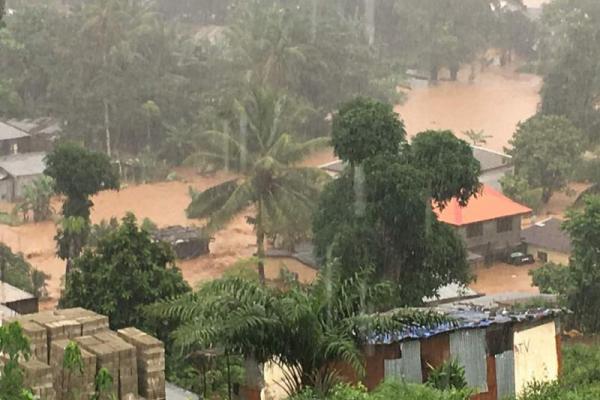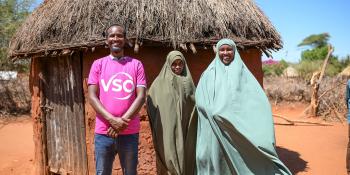Records kept since 1880 show that the Earth has now become warmer by around 1 degree Celsius (or 2 degrees Fahrenheit).
While this might sound like a low figure, its significance is stark. Our earth and its weather systems are finely balanced: even a small change has huge ramifications - and it’s the planet’s poorest people who are shouldering the biggest burden.

Climate injustice

Graph: Rise in floods correlated with rise in temperature. Rise in floods directly correlated with rise in temperature. Source: UK MET; EM DAT: The CRED/OFDA International Disaster Database vis UK Business Insider
Historically, the vast majority of harmful greenhouse gas emissions have been caused by industrialised countries in the Global North. Yet it's often less economically developed countries in the Global South who are experiencing more of the severe weather events triggered by global warming. Yet the poor are less well-equipped to deal with natural disasters - flimsy housing and inadequate healthcare mean that natural disasters of all kinds cause greater damage and suffering. And with fewer resources to recover, the impact of natural disasters can last much longer.
Further vulnerabilities lie in the way weather events greatly affect developing countries' main economic activities — such as farming and tourism.
Not raining, but pouring
Since the 1980’s, scientists have been suggesting that a warmer world is likely to result in heavier rain and increased flooding.
Climate change is by its nature a slow science, but studies over the last few years are beginning to prove them right.
There is growing and substantial evidence that global warming is causing a greater number of severe weather events around the world.
Professor Michael Mann, one of the world’s leading climate scientists, refers to the ‘clear fingerprint of human activity’, which can be found on an increasing number of weather events.
The website Carbon Brief has been compiling data to show which recent weather events can be attributed to climate change.
The human cost
Organisations like VSO, working alongside people living in some of the poorest countries, are already seeing the real human impact of these weather events. In the last few weeks, VSO projects in India, Bangladesh, Sierra Leone and Nepal have been hit by severe weather that may prove to be results of climate change.
Flooding caused by unusually heavy rain has claimed nearly 1,200 lives across India, Bangladesh and Nepal, and affected up to 24 million people across the region.
In Sierra Leone, mudslides triggered by heavy rainfall have resulted in the tragic death of an estimated 1,000 people.
Projects and people affected
The floods in Bangladesh are thought to be the worst in 100 years, with more than a third of the country underwater.
Over 200 farmers who are part of VSO’s and Syngenta’s Growing Together project have been affected by the flooding in Rangpur, the north of the country. There has been significant damage to crops, which will have a severe impact on income in this largely agricultural community.
In India’s eastern state of Bihar, millions have been affected. A group of young VSO volunteers supporting International Citizen Service near Kalienpur, Bihar, Samastipur District had to be relocated.
On Tuesday the city of Mumbai received 12.7cm (5ins) of rain, turning the streets into rivers with people wading through waist-deep waters.
In Nepal, the heaviest rainfall in 15 years has led to flooding and landslides that have claimed at least 131 lives and displaced 45,000 families.
VSO is coordinating relief efforts in the country and the Nepal team of staff and volunteers remain on alert to offer support as even more rain is expected.
The devastating earthquake in 2015 had already crippled Nepal and many in the affected districts were still living in insubstantial temporary shelters which were unable to withstand the recent rains.
Stronger communities

Severe flooding in Sierra Leone
"We know that these floods, and other climate related disasters are going to become more frequent and severe with a warming planet and damage to the ecosystems on which our communities depend," says Clodagh Byrne, Lead Resilience Advisor for VSO.
There is a way forward though.
"The situation is urgent, however the communities that we work with are extremely resilient. We see vital opportunities to work with them to further strengthen their ability to anticipate, prepare and reduce vulnerability so that they can remain strong and resilient in the face of these shocks’.
VSO has made resilience one of its core approaches, recognising the need to focus on supporting marginalised communities to respond to the challenges of climate change.
"Volunteerism and partnerships have a huge role to play," says Clodagh, "Together we can ensure communities, and those most at risk within them, are able to access the resources and skills they need to better adapt to our changing climate."
We’re already seeing some of the effects of this work. Simon Brown, VSO country director for Bangladesh notes that while the floods have been devastating for farmers, the group saving scheme and support structures set up as part of the Growing Together project should allow farmers to recover.
Sierra Leone mudslide appeal
Urgent support needed for families whose lives have been torn apart by the devastating mudslides in Sierra Leone.
Read more

A ripple of change: how VSO volunteers are transforming communities
Every act of volunteering begins with a choice — a decision to act out of a desire to make a difference. Across the world, VSO volunteers are proving that one spark of action can ignite something much bigger.

The two volunteers empowering girls and young women in Mozambique
Nelma and Carmirene and are two volunteers working on VSO's EAGLE project in Mozambique. For Nelma and Carmirene, education is not just about school, it is about meeting people where they are and using the right tools to challenging harmful norms. Here are their stories.
Opening doors to safety, education, and a brighter future
For girls in Karamoja, the poorest region in Uganda, being forced into early motherhood is all too common. This Christmas, you can open the doors to Safety, Education, and a Brighter Future.
